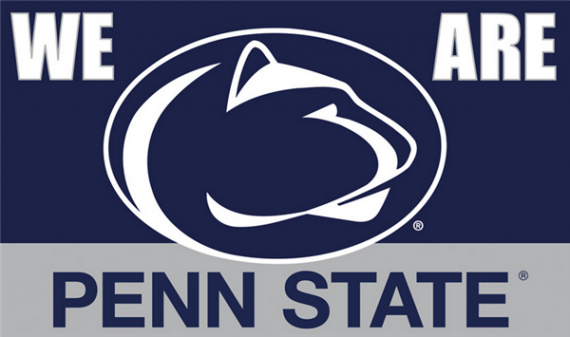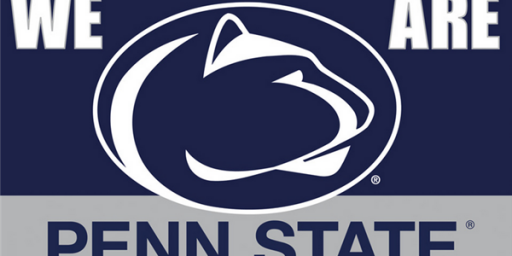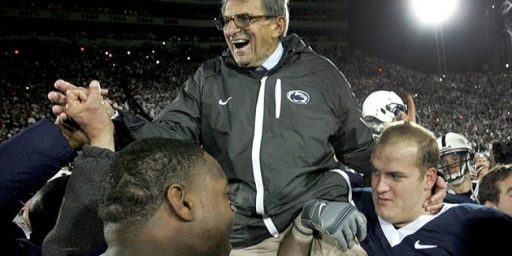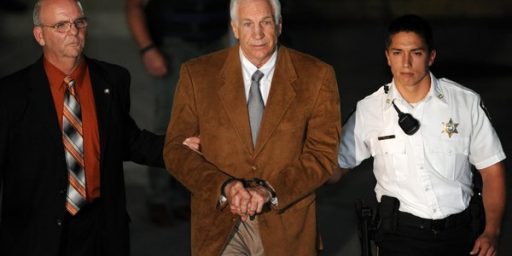Federal Judge Dismisses Pennsylvania Lawsuit Against NCAA Over Penn State Sanctions
Set backs for Pennsylvania in its effort to reverse the NCAA sanctions against Penn State, and a new lawsuit from the Paterno family. The Sandusky story returns.
Last January, Pennsylvania Governor Tom Corbett filed a lawsuit against the NCAA on behalf of the state related to the sanctions that were imposed on Penn State University in the wake of the Jerry Sandusky child abuse scandal. Specifically, the state asserted antitrust violations by the NCAA in imposing the sanctions and asked the court to void those sanctions as impermissible. At the time, I noted the lawsuit seemed to have very little legal merit and seemed to be directed more toward boosting Corbett’s re-election chances in 2014 than anything else. Today, a Federal Judge in Pennsylvania dismissed the lawsuit:
HARRISBURG, Pa. — A federal judge on Thursday threw out the governor’s lawsuit against the NCAA over sanctions against Penn State related to Jerry Sandusky, calling his argument “a Hail Mary pass” that easily warranted dismissal.
U.S. Middle District Judge Yvette Kane’s decision puts an early end to the anti-trust lawsuit Gov. Tom Corbett filed in January in which he sought to overturn a $60 million fine, a four-year bowl ban, scholarship limits and other penalties.
She said she could not “find any factual allegations supporting (Corbett’s) allegation of ‘concerted action’ that might nudge its conspiracy claim into ‘plausible’ territory.”
She said that even if the penalties make it harder for Penn State to recruit quality football players, that would not make it an anti-trust case.
“The fact that Penn State will offer fewer scholarships over a period of four years does not plausibly support its allegation that the reduction of scholarships at Penn State will result in a market-wide anticompetitive effect, such that the ‘nation’s top scholastic football players’ would be unable to obtain a scholarship in the nationwide market for Division I football players,” Kane wrote.
She said the questions the case raises are important matters of public debate but are not anti-trust grounds.
“In another forum the complaint’s appeal to equity and common sense may win the day, but in the antitrust world these arguments fail to advance the ball,” Kane said.
This isn’t entirely unsurprising. As I said when the lawsuit was filed, there just didn’t seem to be much legal merit to the case, and it would have been stretching the boundaries of antitrust law beyond any logical meaning. Pennsylvania will no doubt be appealing this ruling, but I can’t see it being treated any differently at the Third Circuit Court of Appeals than it was by this District Court Judge. Theoretically, Pennsylvania is free to file a new suit against the NCAA based on some other legal theory, of course, but I’d be hard pressed to figure out what it might be, and I doubt that it would have any more of a chance of succeeding than the suit against the NCAA did. Most importantly, though, the fact that Penn State willingly consented to the sanctions would seem to undercut the factual basis of any such case. As I said, it seems clear that Corbett was motivated as much by politics as the law when he gave the go ahead to file this suit.
Today’s ruling isn’t the only recent news about the Sandusky case, though. Last week, after months of hinting that they might do so, the heirs of the late Joe Paterno and others affiliated with Penn State filed a lawsuit against the NCAA over the Penn State sanctions and the claims their report made about Paterno and his actions and inactions during the Sandusky scandal:
Joe Paterno led the Penn State Nittany Lions for 46 seasons and — in the process — became the winningest coach in college football history.
Then came the child molestation scandal involving his former defensive coordinator Jerry Sandusky and allegations that Paterno played a role in concealing it.
The NCAA vacated 111 of his wins over a 14-year period, fined the school $60 million, reduced scholarships and banned it from bowl games for four years.
Paterno died last year, his iconic reputation in tatters.
But his relatives filed a lawsuit Thursday to see that his legacy doesn’t end that way.
The lawsuit — filed by the Paterno family, several members of the Penn State Board of Trustees, faculty, former players and coaches — takes to task the NCAA and a report by former FBI director Louis Freeh, whom the sports body hired to conduct an independent investigation of Penn State’s handling of the scandal.
“The report on which the NCAA relied for its actions is fundamentally wrong, incomplete and inaccurate,” a release from the parties filing the lawsuit said. “The consent decree with Penn State was hastily imposed on the University, completely disregarding the rights of the affected parties.
This lawsuit was filed in state court in Pennsylvania rather than Federal Court, although it would appear from the allegations and damage claims in the Complaint that the NCAA or any of the other Defendants would have the right to remove the case to Federal Court on the basis of diversity of citizenship between the parties. Additionally, unlike the Pennsylvania lawsuit, the Paterno Complaint does not rely on Antitrust claims, but instead alleges state law claims arising under Breach of Contract, Defamation, and Civil Conspiracy. I’m not well-versed enough in Pennsylvania law to be able to comment on the initial sufficiency of the allegations set forth in the Complaint. However, some legal experts in Pennsylvania are expressing doubts about the suit’s merits:
The suit brought by the Paterno family and other Penn Staters against the NCAA Thursday takes a different legal tack from the one brought earlier this year by Gov. Tom Corbett, but it may face some of the same hurdles.
A number of experts reached Thursday said they still questioned whether the plaintiffs – including trustees, former players and coaches and Joe Paterno’s family – will be able to win the right to intervene in a consent decree signed by two other parties.
And, if they succeed on that point, can they successfully argue that the unprecedented agreement they seek to void is unlawful?
As Jo Potuto, a law professor at the University of Nebraska with expertise in sports law, noted about groups like the NCAA and its members, “that’s the way a club functions – you can change the rules of the club.”
But an attorney for the plaintiffs said they are confident in their argument that the NCAA essentially extorted an agreement out of Penn State leaders that has harmed numerous university parties.
“You can’t have a membership organization with thousands of members saying: ‘We can make up the rules as we go,'” said Boston-based Paul Kelly, who is representing trustees, faculty and former players in the action.
“We would never accept that in society, and we shouldn’t accept it here.”
The 40-page suit seeks a complete erasure of the sanctions levied last year against the Penn State football program for a gross loss of institutional control in the Jerry Sandusky child sex abuse scandal. It was filed Thursday in Centre County court.
At first glance, it appears that the Paterno suit doesn’t really have much more merit than the Pennsylvania suit did. However, because of the allegations made and the causes of action asserted, it’s likely that the case will be tough to dismiss on the first go-around. This will be especially true if the matter stays in State Court, where civil cases tend to move at a much slower pace than in Federal Courts. Most of all, though, I really have to wonder why the Paterno family filed this suit. They’re unlikely to be successful in the end, and going forward with the lawsuit will only remind the public of Joe Paterno’s personal failings in regard to the Sandusky matter. Perhaps, someday, Paterno’s career will be judged based on more than just Sandusky, but there’s no doubt that his inactions in the face of evidence of abuse will forever be a part of his biography. No lawsuit is going to change that history.
Here’s the Order in the Pennsylvania lawsuit:
Pennsylvania v. NCAA Dismissal Order by dmataconis
And, here’s the Complaint in the Paterno lawsuit:







Frankly, it sounds like the second case is even more groundless than Penn State’s… It sounds like the family is suing because the NCAA’s vacating the wins is somehow actionable damage against the Paterno estate? Really?
I don’t see how these yahoos even have standing to file… “Hurt feelings” don’t really cut the mustard, IMHO.
I don’t believe it’s feelings so much as money. The family’s and staff’s loss of the Paterno rep has cost money in employment, reputations and residuals. I’d be curious to see if the “faculty” plaintiffs are coaching and athletic department employees.
Clearly she didn’t take Corbett’s faint hopes at re-election into account.
Greetings! Very useful advice in this particular article!
It is the little changes that produce the largest changes.
Thanks a lot for sharing!
It is the best time to make a few plans for the long run and it’s time to be happy. I’ve read this put up and if I could I desire to recommend you few interesting issues or tips. Maybe you could write next articles relating to this article. I desire to read even more issues approximately it!